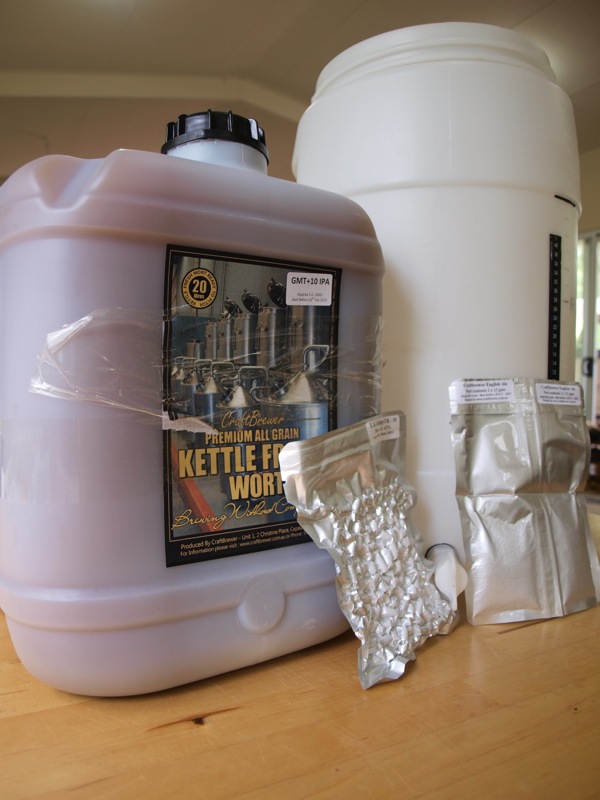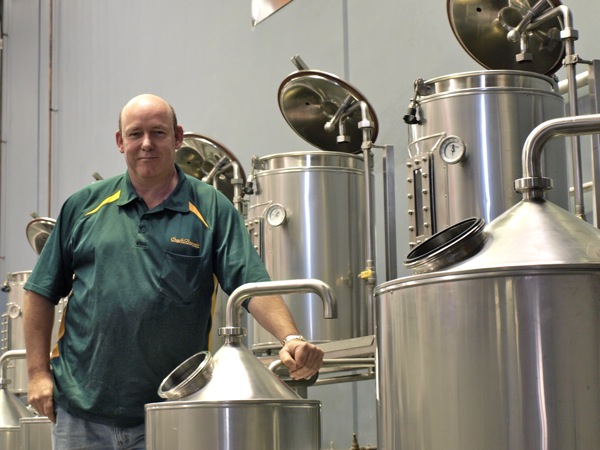
What the FWK?
As a thrusting young-ish beer correspondent I have a terrible problem. I’m fighting a frothing tide of fantastic beers, which arrive on my doorstep from the far-flung fermenters of the globe, laden with the expectation I will imbibe and eulogise.
Sadly the last paragraph was pure fantasy – written under the soporific effects of a slow-motion hop explosion. The truth is, nobody sends me beer and where I live there are no decent pubs and little in the way of innovative bottle shops, so I went out on a shaky limb or two and made the rash decision of trying to make my own beer.
A year later I’ve made a lot of friends, and a fair amount of beer (some good, and some I’d rather forget). I’ve saved a bit of coin (arguably), and I’ve learnt a lot.
Aside from discovering ingredients, recipes and techniques, I’ve learnt better to take beer at face value regardless of the label or its manufacturer’s claims.
I’ve also learnt to close the tap on the fermenter before tipping in 23 litres of wort, and that the glass shelf in my fermenting fridge doesn’t hold a full fermenter.
I’ve learnt patience, too. It’s true; all good things – including good homebrew – come to those who wait. And while fermentation itself requires no effort, preparing the stuff to ferment isn’t so quick and easy. Which is where this review finally begins (I know you were wondering).
As a regular ‘user’ of Craftbrewer’s services, buying hops, grains, yeast and equipment, I noticed they also offer a sneaky shortcut to give a homebrewer an easy out: Fresh wort kits (that’s what the fwk).
Craftbrewer’s premises in the Brisbane suburb of Capalaba, houses what the owner, Ross Kenrick, believes is the country’s only all grain brew on premise facility – Bacchus brewing.
In the brewing shed rests a shiny row of five 80-litre kettles and one 160-litre kettle, allowing Ross (or a homebrewer who wants to have go) to brew as much beer as most microbreweries. Unlike most micros, however, this set up allows him to make six different small batches at the same time.
Ross says they will brew, ferment and package any beer you like – your recipe, one of their own, or they will attempt to replicate something you request, going to the trouble of getting the grain bills from breweries where possible.
The fresh wort kits are a bit different. Craftbrewer prepare the wort and then seal 20 litre batches in square drums (cubes). All you do is pop the lid, pour it in a fermenter with some yeast and let nature do the rest.
I was looking at the Craftbrewer website, salivating over a range of twenty-odd enticing sounding brews – porters and pilsners, summer ales and schwarzbiers – and thinking this might save me a bit of time, when, always a sucker for a pun, I spotted the GMT+10 IPA.
“GMT+10 is based very heavily on the Meantime IPA,” Ross explained.
“But as much as (the Meantime IPA is) one of my favourite beers, it’s very sweet.”
Ross created a slightly more balanced recipe, GMT+10 IPA is designed to be drier and about 6 percent ABV rather than Meantime’s 7.5 percent, although still bursting with hops.
So when I was offered a cube of this to ferment for myself, what do you suppose I said (other than “I promise to retain journalistic integrity in the face of this brilliant freebie”)?
First I took a sample and tested the original gravity (OG), discovering – according to my hydrometer at least – it was a little lower than the approximation on the label[1]: 1058 rather than 1060. No big deal.
And that’s about as technical as it gets.
I sloshed the contents of a cube into a well-sanitised fermenter, let rip with a couple of packets of Craftbrewer’s own blended English ale yeast for good measure, then simply stuck my brewing fridge’s thermostat[2] at 17˚C and stepped back.
Once primary fermentation was complete I dry-hopped with East Kent Goldings and primed gently to avoid over-carbonating an English beer.
The finished product was timed nicely for Easter celebrations and turned out to be dangerously morish and deceptively strong (6.1 percent), still sweet, but not cloyingly so.
This is like a comfort beer, almost nostalgic for a Pom like myself. The earthy, delicate old world hops is the taste of sleepy English villages, handpumps and pubs with dogs sleeping by fires. Like Midsomer without the murders. It takes me to a time before I’d been seduced by the bright lights brash in-yer-face American-style beers.[3]
But that’s just my little world – there are plenty of other fresh wort kits to try and I can’t see why their quality would be any different. This approach to getting a decent quantity of beer is certainly good value for effort, even if it is more expensive than brewing it all yourself.
For the dedicated homebrewer it can’t replace the thrill of experimentation, but if you’re learning the ropes, or are just looking for 20 litres of really good beer at a really good price[4] then it’s a fwking good deal.
While I have tried to remain as objective as possible in writing this Craftbrewer are a sponsor of this site, and the kit was provided gratis.
Fresh wort kits cost from $49 (GMT +10 used in this review cost $59) including delivery in Brisbane. National delivery POA. Fresh wort kits are available from a number of suppliers nationally. Ed
[1] This was an approximation after all.
[2] I wouldn’t dream of trying to ferment without temperature control.
[3] Well, 6.1% is quite strong!
[4] I’m not suggesting that this beer is a like for like alternative for Meantime, but a cost comparison would be ~$25 / litre for Meantime’s IPA, versus around $3.60 / litre for GMT+10 IPA.
*Craftbrewer sponsor Australian Brews News. This story originated from a story idea pitched to us by the author, a freelance writer. While this fresh wort kit was supplied for reviewing purposes he was (and is) a paying customer of the company.
[adrotate group=”1″]






